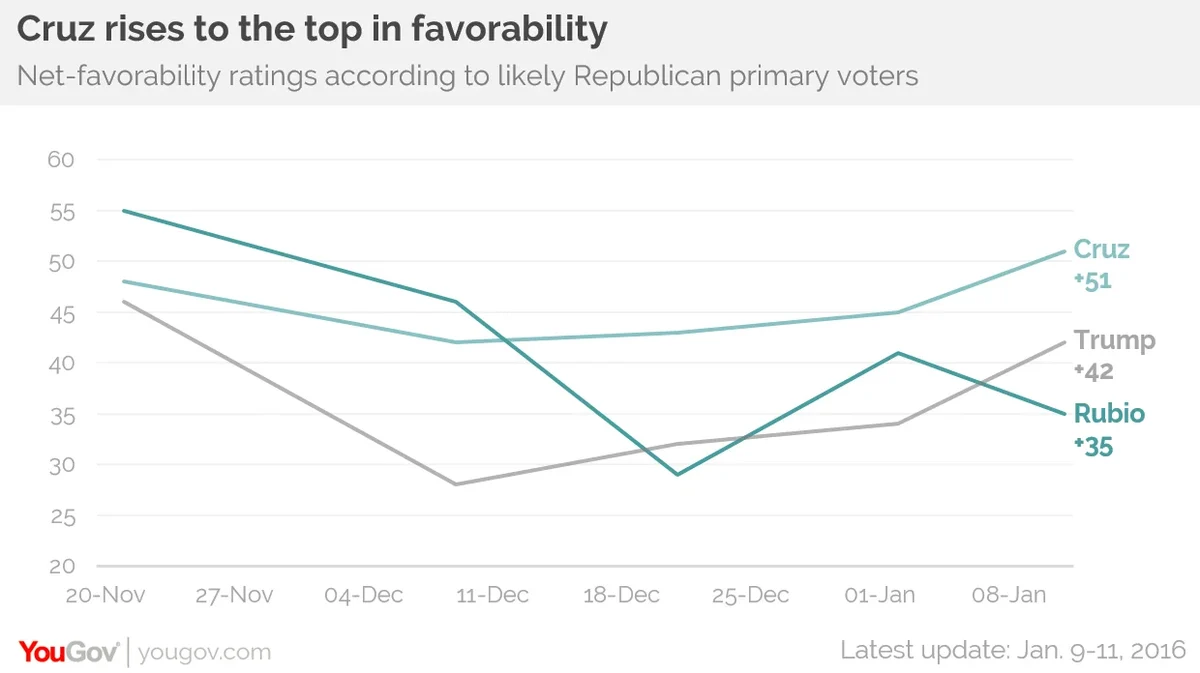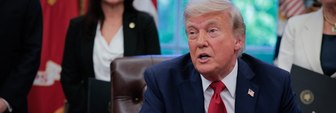Ted Cruz is seen as the “true conservative” of the race, but a “strong” Donald Trump maintains a wide lead
With less than three weeks until the Iowa Caucuses, a new national poll of Republican primary voters finds Donald Trump keeping a dominant lead built on an image of “strength” and “bold” leadership – in stark contrast to the “conservative” ideological advantage that distinguishes Trump’s chief rival in the polls, Sen. Ted Cruz. Behind the two poll leaders, Sen. Marco Rubio, deemed a true contender by politicos and betting markets, is seen as a less experienced than Cruz and as more of an “establishment” politician.
In the survey, likely Republican primary voters were asked whether a number of words and phrases do or do not apply to each politician. For Trump, the picture is clearest: overwhelmingly Republican primary voters say Trump is “bold”, “strong”, and a “Washington outsider”. By contrast, Cruz of Texas holds wide leads over Trump and Rubio when it comes to being a “true conservative”, “religious” and “experienced”. Rubio tops Cruz and Trump on only the phrases “establishment candidate” and “typical politician”.
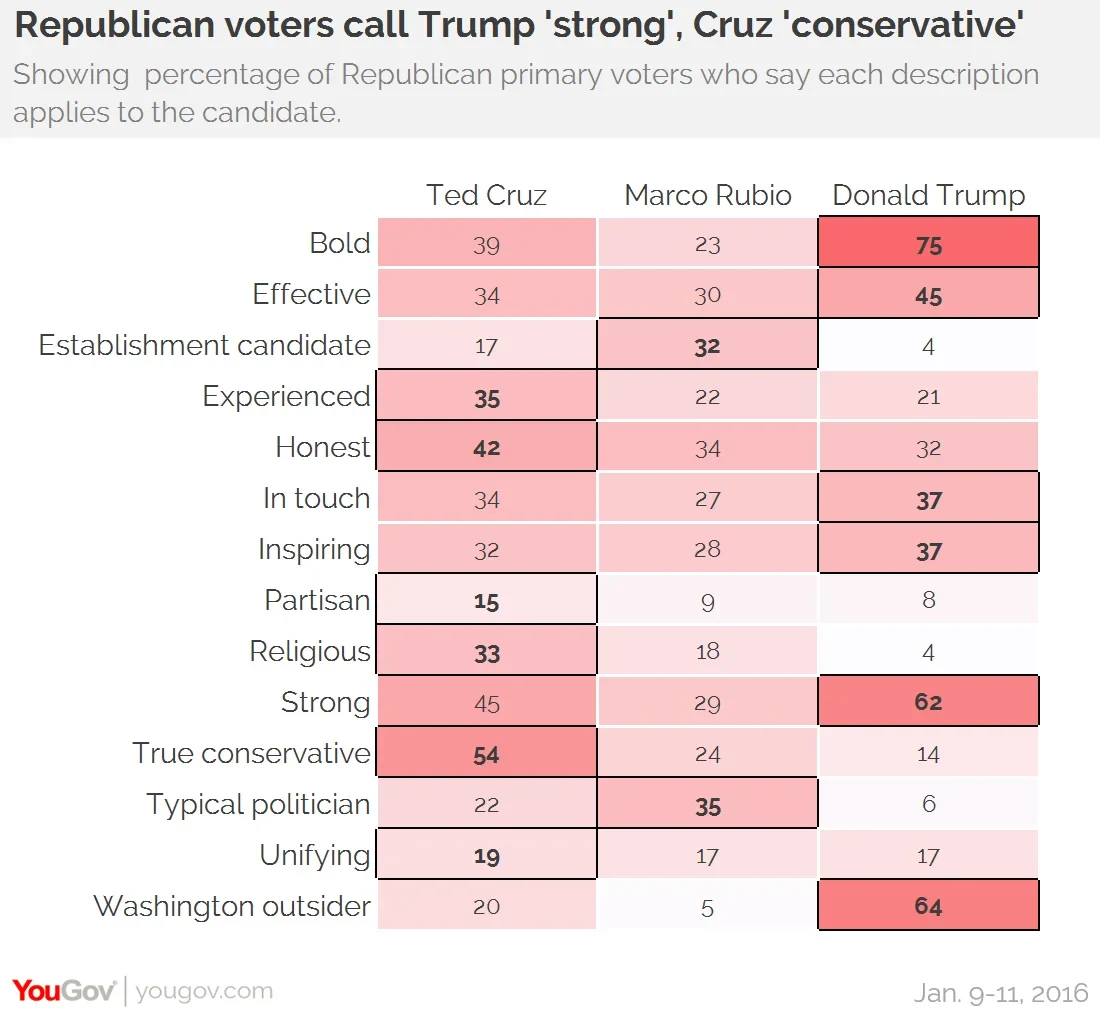
Underlying this dynamic are the national GOP horserace numbers. In the new survey 36% of likely Republican primary voters back Trump, with 20% backing Cruz and 11% for Rubio. Ben Carson is next, with 6% support. The numbers mark little change from the latest YouGov/Economist poll, conducted at the beginning of January, but the overall trend since November is a decline of 6 points for Rubio and an 8-point climb for Cruz over the same period. Carson is also down 4 points. Trump’s position has been steady.
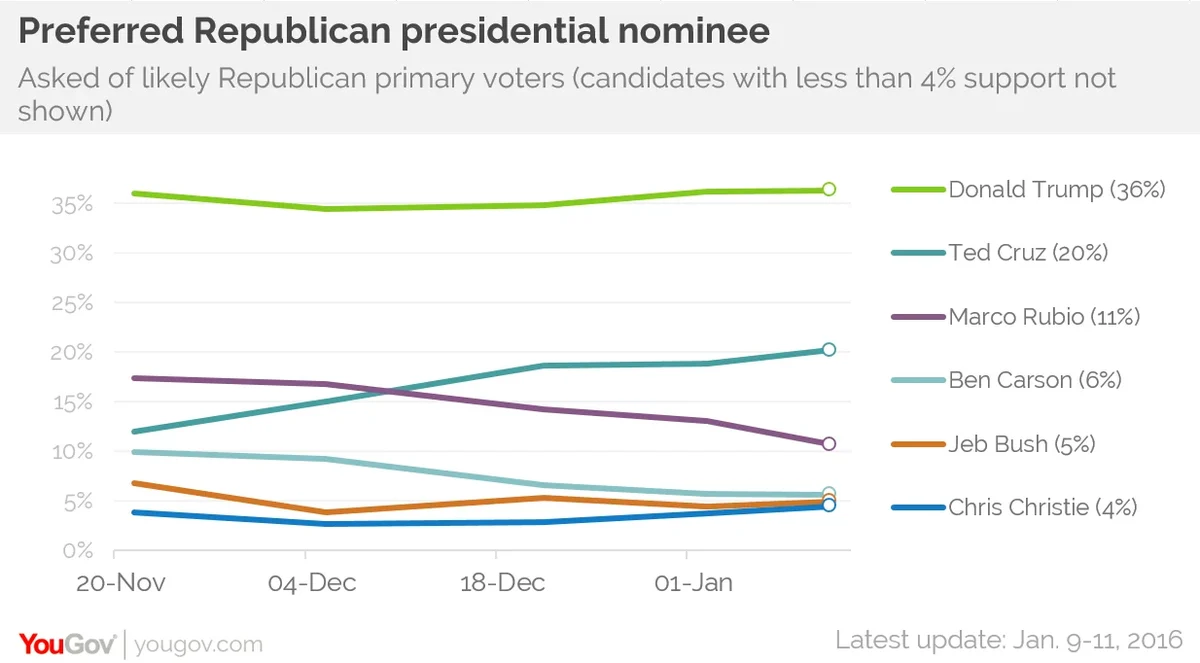
Rubio’s path to victory may rely on a strong showing in an early state like New Hampshire, allowing the Florida Republican to consolidate support from the voters currently backing the handful of more “establishment” candidates, including Jeb Bush and Chris Christie.
But the survey suggest Rubio will also need to win over current Cruz or Trump supporters to build a winning coalition. As it stands, when the race is narrowed to a three-way clash between Trump, Cruz, and Rubio, both Cruz and Trump gain roughly the same number of voters as Rubio: Trump rises to 45%, Cruz to 30% and Rubio to 21% – increases of 9, 10 and 10 points respectively.
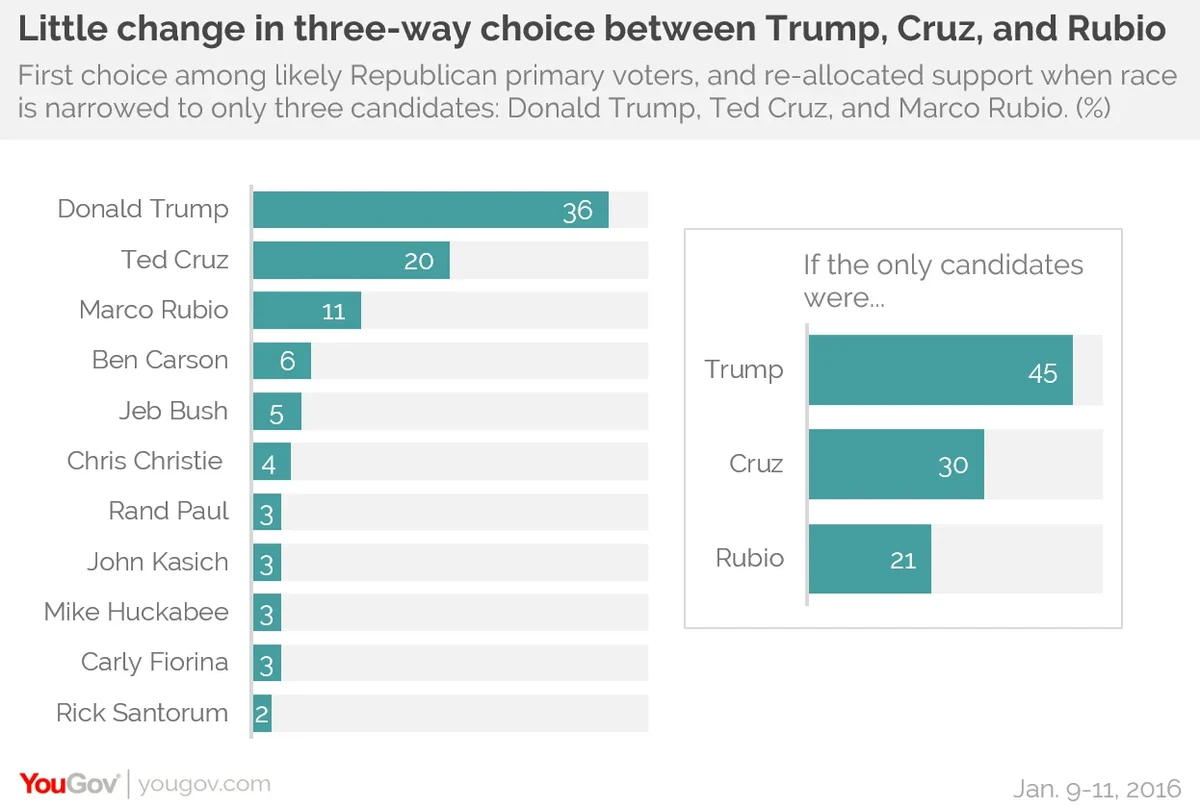
Respondents were also presented with a number of phrases about the three Republicans, some positive, some negative, based on attacks made by other candidates and supportive pitches made by the candidates’ campaigns and their allies.
Perceived lack of experience emerges as a potential weakness for 44-year-old first term senator Rubio, though he is less than a year younger than the 45-year-old Cruz, also a first term senator. Only 40% of Republican primary voters disagree that Rubio “lacks the experience to be president”, compared to 54% for Cruz.
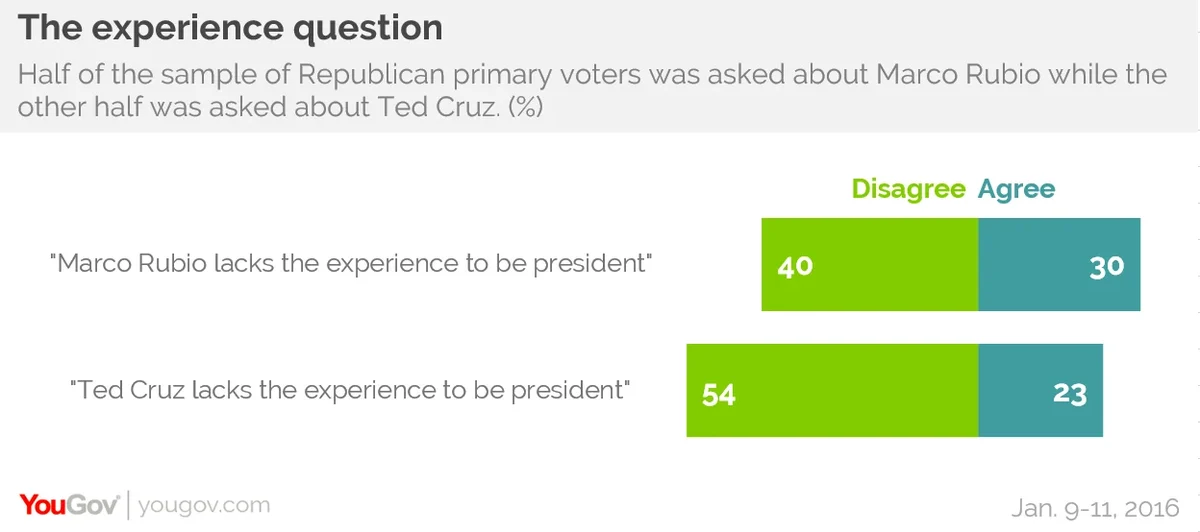
Even respondents with a favorable opinion of Rubio are more skeptical of his level of experience than Cruz’s, the poll finds.
Some of the positive arguments put forth by the Rubio team – that he represents the next generation of conservative leaders or that he is the Republican Hillary Clinton’s campaign “fears most” – receive less than majority agreement.
Cruz has problems of his own. Voters are ready to see Cruz as the real conservative in the race – by 63% to 17% voters say he is a “proven conservative”; by 41% to 30% they say Trump is “not a true conservative” – and as someone who “will stand up to the Washington Establishment”. But Trump’s willingness to break the rules of what a politician – conservative or not – should say or do, continues to be more of a strength than a weakness. By 89% to 4% Republican voters agree Trump “says what other politicians are afraid to say”. These voters also mostly agree (63% to 20%) with Trump’s main argument that he will restore America to greatness.
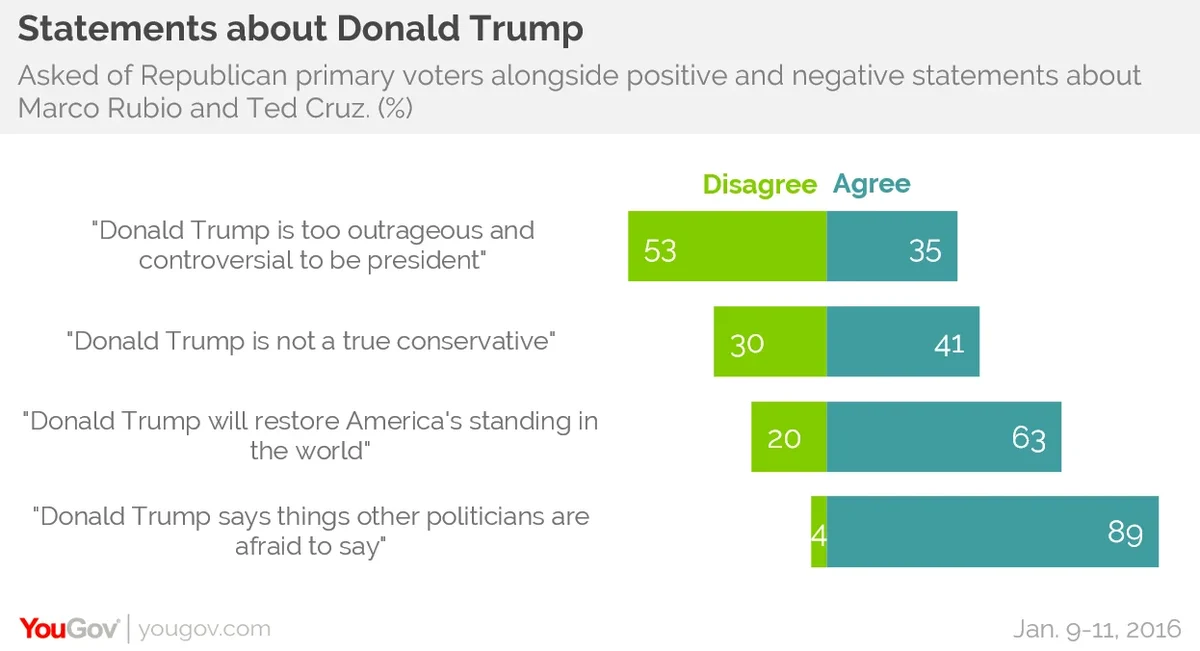
Nevertheless, Cruz has improved his standing with Republican voters, suggesting he could pick up support if the primary goes his way. He is now viewed most favorably of the three Republicans included in this poll, and he topped the entire G.O.P. field in favorability in the most recent YouGov/Economist poll.
